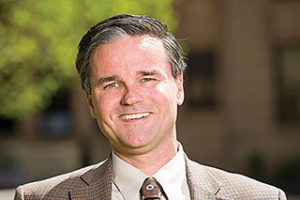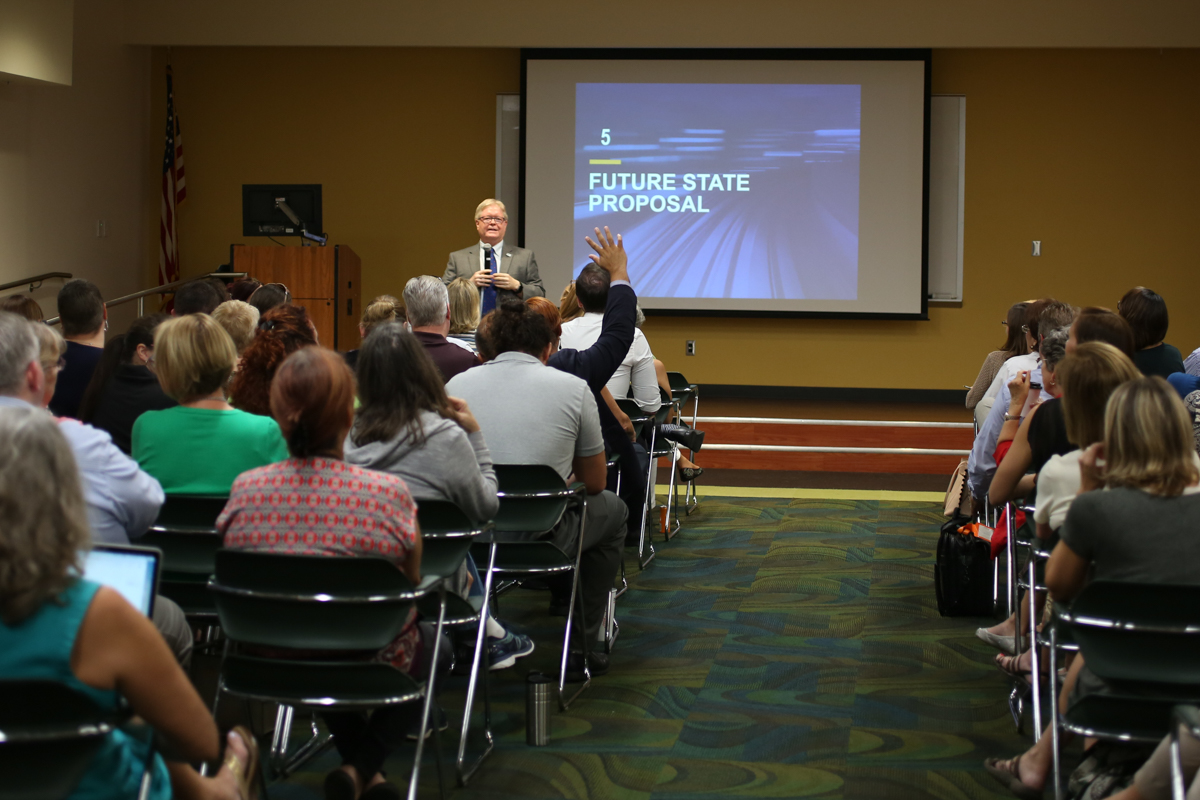Regional Chancellor, Martin Tadlock leads a campus forum on Tuesday afternoon regarding future changes due to the consolidation. Martha Rhine | The Crow’s Nest
By Nancy McCann
Memo to students: It’s about to get a lot harder to change your major.
USF St. Petersburg faculty learned at a campus forum last week that undergraduates are now expected to complete their degrees in four years, and requests by students to change majors will be approved only if the four-year timeline can be met.
Students adding a second major or a minor will also be held to a four-year completion plan. The policy does not apply to students working on a second bachelor’s degree.
“This puts a new burden on freshman orientation,” said Deni Elliott, chair of the Department of Journalism and Digital Communication. “There will have to be a lot of one-on-one counseling.”
This “student progression” policy has been in effect at USF Tampa since 2013, but it had not been put into practice at USF St. Petersburg.
Suddenly, however, the dynamics are different. The Legislature abolished the St. Petersburg campus’ separate accreditation last spring and ordered it returned to the control of Tampa.
The consolidation of the three campuses of the USF system does not become official until 2020, but notable changes already have begun.
Freshman admissions standards at USF St. Petersburg were raised this summer and fall, at least in part because of consolidation.
Tenure and promotion policies for faculty are under scrutiny, and so are academic programs across the three campuses and the general education requirements for students in all majors.
Meanwhile, a consultant hired to help implement consolidation has released preliminary recommendations that would convert the Colleges of Business and Education in St. Petersburg into less prestigious roles.
“Is this a merger, or a hostile takeover?” the Tampa Bay Times asked in an editorial on Friday.
Changing majors
As word of the new policy on changing majors spread on the St. Petersburg campus, some faculty groused privately that the change will crimp students’ flexibility and might even compel some to transfer.
Rebecca Johns Krishnaswami, an associate professor of geography and coordinator of the Interdisciplinary Social Sciences Program, said the change concerns her.
“This policy, like the policy that charges students extra tuition once they go over a certain number of credits, discourages intellectual curiosity and academic exploration,” she said. “While some students will choose a major early in their academic lives that is a good fit for them, others will want to experiment, try new fields, expose themselves to ideas outside their comfort zones.
“When we try to limit students’ ability to try new things or to change directions, we are curtailing their intellectual journey in an unnecessary and, to me, disheartening way,” she said.
But Paul Atchley, dean of undergraduate studies at USF Tampa, said the policy for completing a degree in four years has worked well for students there who want to change majors.
“Students making a change need to be willing to work a little harder, and there are ways to make it work in most cases,” said Atchley.

Students who want to change majors may have to attend classes during the summer semester or take much-compressed classes in the weeks between spring and summer (a period called a “Maymester” on the Tampa campus) or during the winter session between fall and spring, he said.
“I don’t think we are ever going to be in a place where we will deny students the path to follow a passion,” said Atchley. “There can be exceptions. We just want to set up a scenario where we are looking carefully at these changes.”
Having a four-year graduation rate of 60 percent or higher for full-time, first-time-in-college students is one of the benchmarks, or “metrics,” that a Florida public university must meet to become a “preeminent state university” and get extra funding from the Legislature each year.
USF Tampa was awarded preeminent status this summer, but the St. Petersburg and Sarasota-Manatee campuses fall short on some of the metrics – shortcomings they are now under pressure to address.
According to Atchley, the four-year graduation rate metric exists because the state’s financial model works best when students move efficiently through college and new students can take their place.
“Tuition covers only a portion of a student’s seat in class,” Atchley said. “The state pays a portion, and the state is careful with its money.”
As Regional Chancellor Martin Tadlock noted at last week’s campus forum, a student who graduates in four years also saves money.
He said the average additional cost to a student who takes five years, not four, to complete a bachelor’s degree is $68,153, according to The Wall Street Journal. The figure includes lost wages.
Tadlock offered advice to students who “get stressed” about choosing a major.
“The important thing is the skill set you accumulate as you go through college,” he said. “Society changes, and so you will probably change careers anyway. You may not end up working in your baccalaureate major.
“Don’t go overboard about this, but be aware this is a policy we will be enforcing.”
Consultant’s recommendations
At the forum, Tadlock presented a series of slides — marked “for discussion only” – that were prepared by Huron Consulting Group, a Chicago-based firm that was hired to help plan for consolidation.
“This is an initial, very preliminary draft of their (Huron’s) thinking at this point,” said Tadlock. “There are no definitive decisions; these are thoughts to initiate discussion – and they did.”
The terms “home” and “host” are key to understanding the plan.
The home campus is the location of a college, school, department or program, and a host campus delivers courses and programs under the direction of the home campus.
There is only one college in the plan for each field of study; the college may have multiple schools, departments or programs on the same or different campuses.
In Huron’s 86-page report, which is full of flow charts and color-coded tables, a “reimagined” USF system would have only one college of business and one college of education – both in Tampa.
The Kate Tiedemann College of Business on the St. Petersburg campus would become the Kate Tiedemann School of Finance and Entrepreneurship and the College of Education here would become a Department of Science and Math Education.
Huron’s model of the College of Arts and Sciences is pending while discussions continue, Tadlock said.
Doctoral programs were not included in the early recommendations, but St. Petersburg will definitely have them, he said.
On the plus side, St. Petersburg is designated as home for a new College of Oceanography, Environmental Sciences and Sustainability that would include a School of Marine Science. Now, the College of Marine Science is based in St. Petersburg but reports to Tampa.
Tadlock stressed that “we will be making our recommendations back … Our deans are talking.”
Huron’s work is “not done, and nothing has been decided,” said Tadlock. “We (St. Petersburg) will go after what we want and go after what we need.
“They (Huron) lit the fire, and that’s not a bad thing, because we need to have those conversations.”
In its editorial on Friday, however, the Times offered words of warning.
The initial version of the Huron consolidation plan “short-changes the St. Petersburg campus in exactly the ways skeptics of the consolidation feared,” the paper said, “and supporters of this gem on the downtown waterfront should speak up before it’s too late.”
Read the Times editorial, “USF merger plan needs work,” at https://www.tampabay.com/opinion/editorials/editorial-usf-consolidation-plan-needs-work-20180927/



